Text
The Imperative Mood: ~아/어(요), ~(으)세요, ~아/어라, (으)십시오, ~지 말다
There are many ways to end a sentence. Depending on who you are speaking to (and many other factors) the way you end a sentence can vary tremendously. In the imperative mood as well, there are many different ways you can give a command to somebody.
Verb stem + ~아/어(요)
The easiest (and least formal) way to give a command in Korean is simply by adding ~아/어 to a verb stem. Adding ~요 to the ends of the sentences above make them more formal.
밥을 천천히 먹어(요) = Eat your food slowly
열심히 공부해(요) = Study hard
Notice that in both English and Korean, the subject isn’t usually used in a sentence when giving a command. This is because the person you are giving the command to is usually the subject, so it is omitted.
You can use this form when you are giving a command to somebody who is younger than you or the same age as you, or somebody who you are close with.
The formal addition of ~(으)시 could be added to the construction as well. In these cases, ~아/어(요) is added to ~(으)시다.
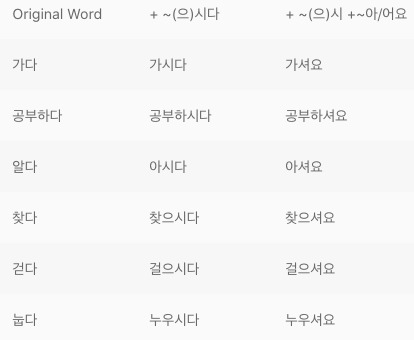
Notice that these imperative conjugations are no different than any regular present tense conjugation. For example, the following two sentences are conjugated into the present tense, but the addition to the verb is exactly the same as an imperative conjugation:
져는 월요일마다 운동해요 = I exercise every Monday
저의 할머니가 여기 에 자주 안 오셔요 = My grandmother doesn’t come here often
In these cases, distinguishing between a regular sentence and an imperative sentence is done through context.
이거를 봐요 = Look at this
빨리 올라오셔요 = Come up quick
먼저 올라가 = Go up first (you can go up first)
이 길에서 직진해요 = Go straight on this road
Although they differ in their respective levels of politeness, all of the above are acceptable ways to make a command. That being said using ~(으)셔요 is less common. Instead, the construction of ~(으)셔요 is often pronounced and written as ~(으)세요.
Verb stem + ~(으)세요
~(으)셔요 can be used as a formal way to make a command. However, nowadays, it is much more common to pronounce and write ~(으)셔요 as ~(으)세요. This can only be done when you see ~(으)셔요 and not with any other form that ~(으)시다 can create.
가셔요 = 가세요
공부하셔요 = 공부하세요
However,
가셨어요 can not be said as 가셨으세요
가셔 cannot be said as 가세
가시다 can not be said as 가세다
Only when you see ~(으)셔요 can you use ~(으)세요.
One of the reasons why you would add ~(으)셔요 to a word is if you were making a command. This means that ~(으)세요 can replace ~(으)셔요 in each of the examples above.
이거를 보세요 = Look at this
빨리 올라오세요 = Come up quick
이 길에서 직진하세요= Go straight on this road
More examples:
구고하세요 = Work hard! (A common greeting when people leave a place of business)
열심히 운동하세요 = Work out hard!
먼저 가세요 = Go first
칠판을 올려다보세요 = Look up to the board
시선을 돌리세요 = Turn away your eyes
보안을 위해 대통령을 내일까지 감시하세요 = For security, watch/guard the president until tomorrow
Imperative endings are often added to 있다 to command somebody to “stay” in a place or in a state. 있다 is often an adjective, but there are times when it is considered a verb. When telling somebody to “stay” like this, 있다 is seen as a verb.
집에 있어 = Stay at home (be at home!)
잠깐 여기 있어 = Stay here for a second
그냥 집에 있어= Just stay at home
The adverb 가만히 (to stay still or to not move) is often used in sentences like this to tell somebody to “stay” still.
가만히 있어 = Stay still!/Don’t move!
계시다 is the formal equivalent of this usage of 있다. When ~아/어요 is added to 계시다 to create a command, the construction 계셔요 is formed which you now know can be presented as 계세요. This is where the expression 안녕히 계세요 (which translates to “stay in peace”) comes from.
Use the ~(으)세요 form when giving a command to a person who deserves respect, but at the same time be aware of the ~(으)셔요 form in case it comes up.
~(으)셔요 can be added to make a command.
~(으)셔요 is also a regular present tense conjugation.
엄마는 매일 운동하셔요 = My mother exercises every day
When you see ~(으)셔요 can you use ~(으)세요.Therefore, the sentence above could also be used as:
엄마는 매일 운동하세요 = My mother exercises every day
This can be applied to any situation.
네, 가능하셔요 = 네, 가능하세요 = Yes, that is possible
(This is often heard when asking if you can do something [like use a card or combine coupons] at a store/restaurant)
이 분은 제 엄마이셔요 = 이 분은 제 엄마이세요 = This person is my mother
선생님, 어디 가셔요? = 선생님, 어디 가세요? = Teacher, where are you going?
그 사람이 언제 오셔요?= 그 사람이 언제 오세요? = When is that person coming?
Adding ~(으)세요 (or ~(으)시다) to a stem can create irregulars. If added to a word with the ㄷ irregular:
걷다 = to walk
걷다 + ~(으)세요 = 걷 + 으 + 세요
걷 + 으 + 세요 = 걸으세요
걸으세요 = walk!
If ~(으)세요 is added to a word with the ㅅirregular:
짓다 = to build
짓다 + ~(으)세요 = 짓 + 으 + 세요
짓 + 으 + 세요 = 지으세요
지으세요 = build!
One weird thing is that people rarely (if ever) say ~(으)세요 connected to 먹다 (to eat). Instead, it is much more natural to add ~(으)세요 to 들다 (which is a more formal way to say “eat”). Another change occurs when adding ~(으)세요 to verbs that follow the ㄹ irregular:
들다 = to eat (formal)
들다 + ~(으)세요 = 들 + 세요
들 + 세요 = 드세요
드세요 = Eat!
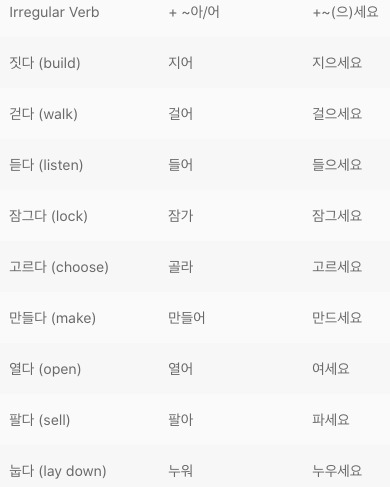
Verb stem + ~아/어라
Another way to give a command in Korean is by adding ~아/어라 to a verb stem. The formality is similar to the ~아/어 form you learned previously.
빨리 가라 = Go fast!
그렇게 해라 = Do it like that
내 말을 들어라 = Listen to what I say
밥을 먼저 먹어라= Eat (rice) first (you can eat first)
However, the ~아/어라 form is generally used by much older people (parents or grandparents) when they are giving orders to younger people. The formality is very similar (if not the same) as ~아/어, but I would much prefer to use ~아/어 over ~아/어라.
Verb stem + ~(으)십시오
Adding ~(으)십시오 to a verb stem is done in the same manner as when adding ~(으)세요. That is, the same irregulars come in to play. However, adding ~(으)십시오 to a verb stem allows you to give a command very formally for speaking to people who deserve a ridiculous amount of respect. If you were meeting your girlfriend/boyfriend’s grandparents for the first time, you might use this ending. It is also sometimes on government buildings/stores/restaurants on signs saying “come again,” etc.
여기서 내리십시오= Get off here (this is broadcasted in the Seoul subway at every stop)
To tell somebody to “go,” add one of the many ‘imperative mood’ conjugations to 가다 (in order of formality).
가다 + ~아/어 = 가!
가다 + ~아/어라 = 가라!
가다 + ~아/어요 = 가요!
가다 + ~(으)세요 = 가세요! (가셔요)
가다 + ~(으)십시오 = 가십시오!
Negative Imperative Mood: ~지 말다
You can also use the imperative mood to make a negative command to tell somebody not do something with 말다, which means “to not do something” or “to drop the intention of doing something”.
When used to make a negative command, ~지 말다 should be added to the stem of a word and then conjugate it using one of the many ‘imperative mood’ conjugations.
가지 말다 + ~아/어 = 가지 마
가지 말다 + ~아/어라 = 가지 마라
가지 말다 + ~아/어요 = 가지 마요
가지 말다 + ~(으)세요 = 가지 마세요
가지 말다 + ~(으)십시오 = 가지 마십시오
Notice that numbers 1, 2 and 3 go against the normal grammatical rules of Korean. 말다 is an irregular verb in this respect and no other verb follows this pattern. (These irregular conjugations only apply when specifically attaching the additions shown above. In all other situations, 말다 follows the ㄹ irregular like a normal verb ending in ㄹ.)
All five of those conjugations are possible. However, the two most common are # 1 and #4. When speaking to somebody informally, you will most likely hear 가지 마. When speaking to somebody formally, you will most likely hear 가지 마세요.
밥을 너무 빨리 먹지 마세요 = Don’t eat your food too fast!
부끄러워하지 마세요 = Don’t be shy!
그렇게 하지마= Don’t do it like that!
집에 가지 마 = Don’t go home!
앉지 마 = Don’t sit down!
여기에 오즘을 싸지 마세요 = Don’t pee here
권력을 남용하지 마세요 = Don’t abuse your power/authority
오늘이 유쾌한 날이라서 슬퍼하지 마세요 = Today is a delightful day, so don’t be sad
사람들을 학력 수준으로 평가하지 마세요 = Don’t judge people on the basis of education level
그 학생들에게 허가를 해 주지 마세요 = Don’t give those students permission
Ways to use these imperative sentences
~지 말고
You can also add ~고 ("and) to 말다 to make expressions such as “not ... but ...”, or “do not ... and do this .... [instead]”.
A 말고 B: When saying “not A, but B” where A and B are nouns, use 말고 between the two nouns.
우유 말고 커피 주세요 = Give me NOT milk BUT coffee ( Do not give me milk, give me coffee)
이거 말고 저거 살게요 = Not this one, but that one over there, I will buy it (I will buy that one over there, not this one)
내일은 여기 말고 다른 곳에서 만날 거예요 = Tomorrow, we are going to meet NOT here, BUT in a different place [instead] / Tomorrow we are going to meet at a different place rather than here.
[Verb A]지 말고 [Verb B]: When saying “do not do A, but/and do B” where A and B is a verbs, add ~지 after the verb stem of Verb A just like with sentences ending in ~지 마세요.
When used with verbs to connect a negative command with another clause, the clause after ~지 말고 is typically a positive command. This type of sentence is used when you want to tell somebody what not to do, and then also tell them what they should do.
매일 같은 운동을 하지 말고 많이 쉬세요 = Don’t do the same exercise every day, and get lots of rest
그렇게 하지 말고 내 말을 들어봐 = Don’t do it like that, and listen to what I have to say
한 사람에게 다 주지 말고 사람들과 동등하게 나누세요 = Don’t give them all to one person, hand/divide them out evenly
걱정하지 말고 그냥 해 봐요 = Do not worry and just give it a try
늦지 말고 일찍 오세요 = Do not be late and come early
전화하지 말고 문자 메시지 보내 주세요 = Do not call me but [rather] send me a text message
저 기다리지 말고 먼저 가세요 = Do not wait for me and leave first / Please go first without waiting for me
차가운 물에 넣지 말고 뜨거운 물에 넣으세요 = Do not put it in cold water but put it in hot water
지금 사지 말고 조금만 기다리세요 = Do not buy it now and wait just a little while
Giving Directions
Commonly used direction-like sentences:
오른 쪽으로 가세요 = Go right
왼 쪽으로 가세요= Go left
직진하세요= Go straight
건물을 지나가서 오른 쪽을 가세요= Go past the building, then go right
건물을 지나가서 오른 쪽으로 가지 말고 계속 직진하세요 = Go past the building, then don’t turn right, but keep going straight
Imperative Mood with ~아/어 보다
~아/어 보다 can be added to words to create a meaning that is similar to “attempt/try.”
엄마가 요리한 음식을 먹어 봤어? = Did you try the food mom cooked?
결혼하기 위헤 남자들을 만나 봤어요 = In order to get married, I tried meeting a lot of men
Just because of the meaning of “attempt,” it is very common to see an imperative ending attached to ~아/어 보다.
그것은 확인 해 봐! = (Try) check(ing) that!
이것을 먹어 봐! = (Try) eat(ing) this!
Although the typical translation of ~아/어 보다, in these cases is “try”, it is often eliminated.
Especially when used in the least formal imperative form (~아/어 봐), it is very common to see this used simply as a command without any meaning of “try/attempt.” Nonetheless, the meaning of “try/attempt” is often very subtle and doesn’t really change the meaning of much in the sentence.
여기 와 보세요 = Come here (Try coming here)
지금 앉아 봐 = Sit down (Try sitting down)
문을 열어 봐 = Open the door (Try opening the door)
먼저 가 봐 = Go first (Try going first)
이것을 봐 보세요 = Look at this (Try looking at this)
이거를 드셔 보세요 = Eat this (Try eating this)
이 차를 마셔 보세요 = Drink this tea (Try drinking this tea)
이 제품 수준을 높여 보세요 = Try to raise the level/standard of this product
그 강아지가 온순해 보여서 한 번 만져 봐 = That dog looks calm/gentle, so try touching it
직원이랑 잠깐 얘기해 보세요 = Try talking with a staff member
이 물체가 무엇인지 새각해 봐 = Try thinking about what this object is
Fixed Expressions
어서 오세요 = Welcome (lit. Come quickly)
안녕히 가세요 = Good-bye (lit. Go peacefully)
안녕히 계세요 = Good-bye (lit. Stay peacefully)
안녕히 주무세요 = Goodnight (lit. Sleep peacefully)
References
HTSK Unit 2 Lesson 40: The Imperative Mood: ~아/어(요), ~(으)세요, ~아/어라, (으)십시오, ~지 말다
TTMIK Level 2 Lesson 26. Imperative / -(으)세요
TTMIK Level 2 Lesson 27. Please do it for me. / -아/어/여 주세요
TTMIK Level 2 Lesson 30. Don’t do it. / -지 마세요
TTMIK Level 5 Lesson 19. To tell someone to do something / Verb + -(으)라고 + Verb
TTMIK Level 5 Lesson 24. Not A But B, Don’t do THIS but do THAT / 말고, -지 말고
Examples
~지 말다 attached to 내려가다 on a Korean sign
17 notes
·
View notes
Text
google drive of free korean language learning resources
hi everyone! because i put tutoring on hold while i am working full time but still want to provide help to those who want to start learning/want to practice their korean, i am continuously compiling material for free learning :)
resources are totally free!
most are typically aimed at children (which is great for beginners!!)
hangul practice
vocabulary building
printable/downloadable
example of scans:


example of grammar breakdowns:
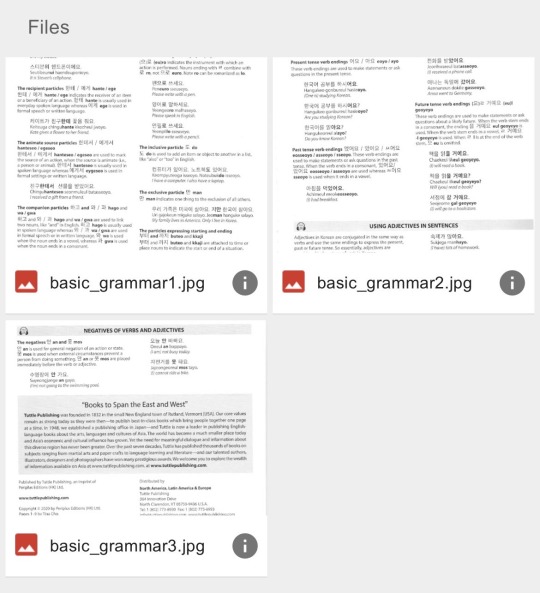
i will be adding material over the coming weeks and continuously as i come across material! updates may be frequent or slow down at times.
note: resources are free, and they’re totally free to share and use! but please do not repost without credit, and because i buy these from my workplace with my own money and spend time scanning them and cleaning them up and organizing them, please consider tipping me as much as you’d like ♥️
here is the link to the drive! (sorry, can’t hyperlink on mobile currently)
enjoy, and thank you in advance! have fun and feel free to ask me any questions—i am a korean studies grad and was a tutor for the beginning korean classes at my university. i am happy to help however i can!
♥️ joey
2K notes
·
View notes
Text
does anyone have any tips for possible language exchange apps or methods? i’ve been on hellotalk for almost a year but my experience has gone down since then. i recently turned 18, so now most of everyone in my feed is 25+ and i’m not completely comfortable having one on one conversations with people that old. while im glad it further protects minors from predators, i wish it still showed people within my age range 😭 i haven’t found a language partner since i’ve been on there and everyone who offered at first is no longer active. im thinking of just deleting the app altogether but i really need to improve my korean speaking 😭 idk what to do at this point so any pointers would be appreciated thank you
4 notes
·
View notes
Text
Interesting Korean Word Of The Day: To Love Or Hate That Is The Question
호불호가 갈리다 – To love or hate something/ for something to be polarizing
“마르마이트는 호불호가 갈리는 음식이다.” Marmite is a food that people either like or dislike.
“민트 초콜릿 아이스크림은 호불호가 갈리는 음식이다.” Mint chocolate ice cream is a food that people either like or dislike.
Break down of the word:
호불호: Likes and Dislikes
갈리다: to be divided/ to be split
49 notes
·
View notes
Text
여행 🧳

some travel-related vocabulary 🍃 💫 (i just wrote down some hints or emojis to help me remember better)
나라
비행기 ✈️
경치 🌄🌌🏞🌇
야경 🌌🌃🌉🌠🎑 (밤 경치)
해돋이 🌅 (아침에)
시골 🌾
도시 🏙
호수 (l…)
강 (r….)
산 ⛰
화산 🌋
바다 🌊🏖
박물관 (m…..)
유적지 (historic site)
유학을 가디 (go study abroad)
휴가 (v…….)
카페
극장 🎭🍿
도서관 📚
여권 (p…….)
숲 🌳🌳🌳
기차 🚂
공항 (비행기를 타는 곳)
경험 (exp…….)
온천 ♨️
섬 🏝
드라마 촬영지 📽🎬
민속촌 (folk village)
공기 (a..)
호텔
대사관 (embassy)
입장료 (a………) 표 🎟
궁전 🏯🏰
숙소 (lodging)
공연장 = 콘서트장
행사 = 이벤트
해양 = 큰 바다

Verbs/Adjectives/Expressions:
재미있는 시간을 보내다
방문하다
인기가 많다
유명하다
시끄럽다
조용하다
도착하다 (arrive)
떠나다 (hit the road)
사진을 찍다
계획을 세우다
여권을 준비하다
비자를 받다
숙소를 예약하다
비행기표를/기차표를 사다
가방을/짐을 싸다
환전을 하다 (돈 exchange)
물건을 싸게 사다/구입하다
즐기다 (enjoy)
구경하다 (watch)
참가하다 (participate)
예약하다 (make a reservation)
구입하다 = 사다
사람들이 친절하다
교통이 편리하다/불편하다
4 notes
·
View notes
Text

https://www.koreanblogs.com/post/korean-slangs-from-ordering-coffee-in-a-cafe-to-2022
Korean slangs 2022
8 notes
·
View notes
Text
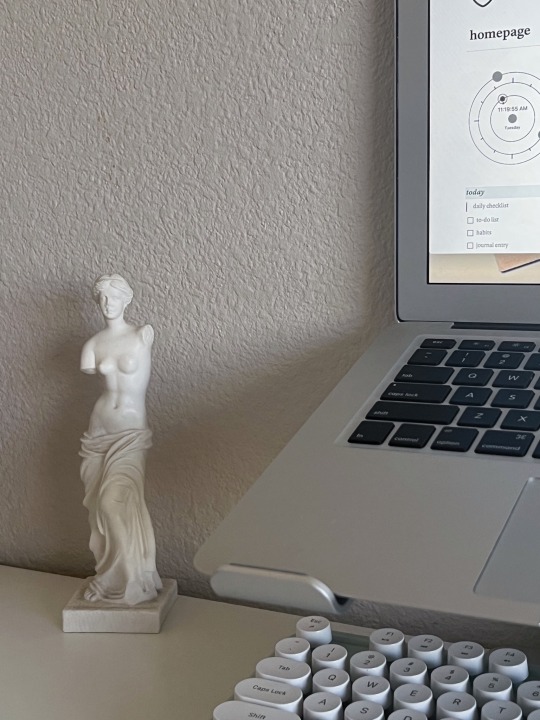
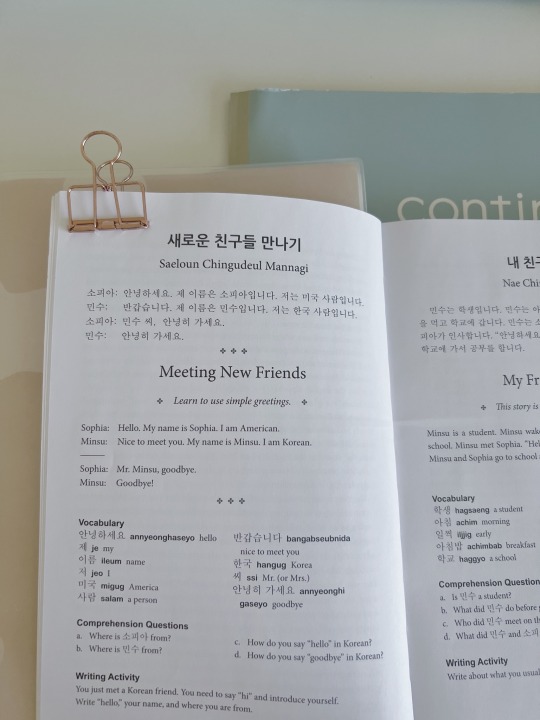
11.29.22
redid my notion homepage and back to it with my korean studies! i’m excited to read more in this korean stories book i just bought, especially since my favorite method of learning languages is by reading.
987 notes
·
View notes
Text
231115 Vocab
대담: conversation, talk
정해진 주제에 대해 서로 말을 주고받는 것. 또는 그 말.
An exchange of views on a specific subject, or the spoken words.
자발적: being voluntary
남이 시키거나 부탁하지 않았는데도 자기 스스로 하는 것.
The attitude of doing something of one's own accord, without being ordered or requested to.
항간: civil, public
일반 사람들 사이.
A state of being among ordinary people.
불황: recession, depression
사회의 경제 활동이 활발하지 않아, 물가와 임금이 내리고 생산이 줄어들며 실업이 늘어나는 상태.
A state in which prices and wages fall, production decreases, and unemployment increases as economic activity is depressed.
막연하다: vague
뚜렷하지 않고 어렴풋하다.
Obscure, not clear.
처하다: face, encounter
어떤 형편이나 처지에 놓이다.
To be placed in a certain situation or position.
탐독하다:
(1) devour, read avidly
어떤 글이나 책을 집중하여 읽다.
To read a certain piece of writing or book very attentively.
(2) enjoy, especially like
어떤 글이나 책을 특별히 즐겨 읽다.
To like to read a specific piece of writing or book more than others.
궁극적: being ultimate, being final
어떤 일의 마지막이나 끝에 도달하는 것.
Reaching the last stage or end of a certain work.
지지자: supporter
어떤 사람이나 단체 등이 내세우는 주의나 의견에 찬성하고 따르는 사람.
A person who agrees with or follows the principles or opinions that are asserted by a certain person, group, etc.
탁월하다: excellent, distinguished
남보다 훨씬 뛰어나다.
Far superior to others.
번지르르하다: deceptive, showy, slick
말이나 행동 또는 사물 등이 실속 없이 겉으로만 그럴듯하다.
A remark, behavior, object, etc., just looking good without substance.
번복하다: change, reverse
이리저리 고치거나 뒤바꾸다.
To correct or alter one's statement or position.
41 notes
·
View notes
Text


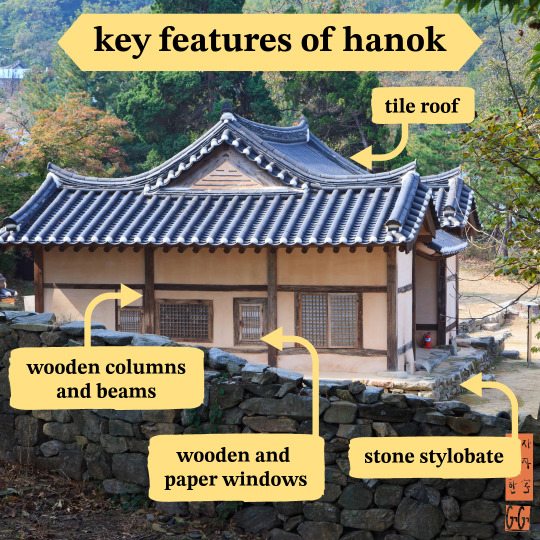
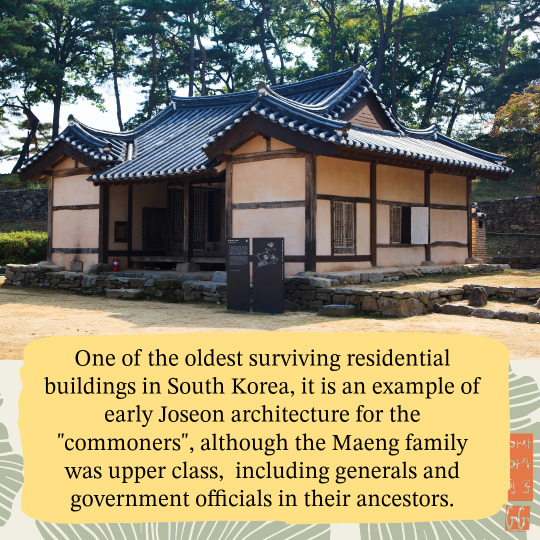
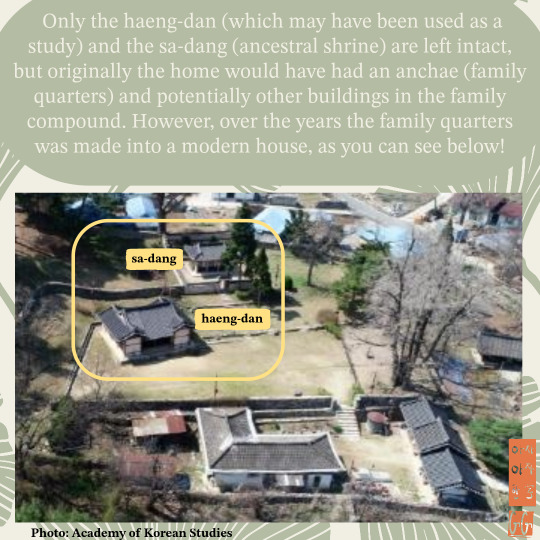

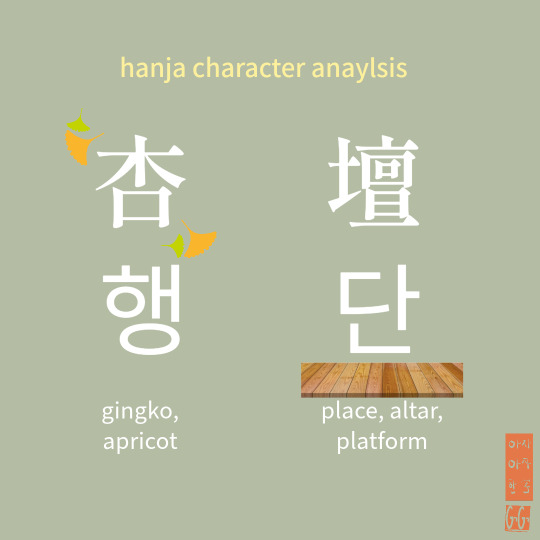
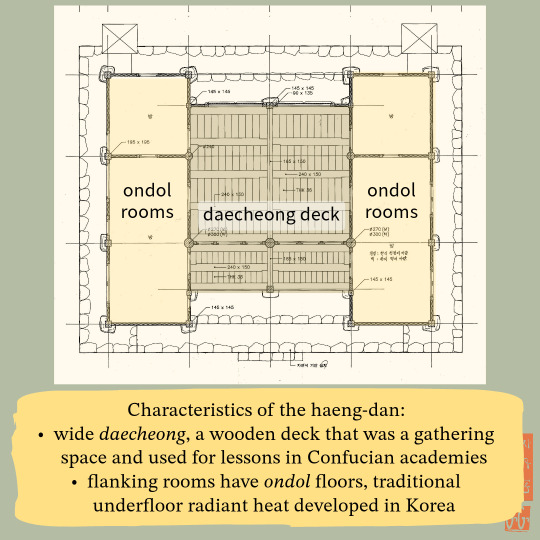

All about Hanok, the Korean traditional home, using the oldest surviving example of the Maeng clan haeng-dan! It is an example of architecture from the beginning of the Joseon dynasty (start:1392) which has been maintained according to the old way of building.
The name 행단 refers to a place with a gingko tree, which makes reference to Confucius teaching pupils under a gingko tree. In Joseon, Confucian culture became a main part of the national culture, replacing previous national Buddhism in Goryeo dynasty.
174 notes
·
View notes
Text
자기 and 자신: oneself
When referring to somebody in the third person, you use words like “he,” “she,” or “that person.”
그는 한국을 좋아해요 = He likes Korea
그녀는 한국을 좋아해요 = She likes Korea
그 사람은 한국을 좋아해요 = That person likes Korea
자기
자기 is usually used in sentences when a person has already been mentioned, and is being mentioned again.
He likes his appearance
= 그는 그의 외모를 좋아해요
= 그는 자기(의) 외모를 좋아해요
자기 is used to replace the person you are talking about the second time you mention that person.
우리 아들은 자기(의) 일을 항상 혼자 하고 싶어요 = Our son always wants to do his work alone
저의 아내는 자기가 요리한 것을 보통 안 먹어요 = My wife usually doesn’t eat the food she cooks
우리 아들은 자기 건강에 대해 의사랑 신담을 했어요 = Our son consulted with a doctor about his health
여자가 변한 자기 모습을 봐고 실망했어요 = The girl looked at her changed appearance and was disappointed
In the example sentences above using 자기, some person is being referred to twice in the same sentence. Although this person is mentioned twice, the person is not the subject and the object of the sentence.
우리 아들은 자기(의) 일을 항상 혼자 하고 싶어요
The subject is “our son.” The object is “his work.”
저의 아내는 자기가 요리한 것을 보통 안 먹어요The subject is “my wife.” The object is “the food (she cooks).”
자신
When one person is both the subject and the object of a sentence, the word 자신 is used as the object. The translation of 자신 to English depends on who the person is, but the basic form you will see is “oneself.”
저는 자신을 안 믿어요 = I don’t trust myself
너는 자신을 안 믿어? = You don’t trust yourself?
그는 자신을 안 믿어요 = He doesn’t trust himself
그녀는 자신을 안 믿어요 = She doesn’t trust herself
그들은 자신을 안 믿어요 = They don’t trust themselves
It is common to place the following words before 자신:
나/내/저/제 if the subject is “I”
너/네 if the subject is “you”
그/그녀/자기 if the subject is “him” or “her”
그들 if the subject is “they”
저는 제 자신을 안 믿어요 = I don’t trust myself
너는 네 자신을 안 믿어? = You don’t trust yourself?
그는 그 자신을 안 믿어요 = He doesn’t trust himself
그녀는 자기 자신을 안 믿어요 = She doesn’t trust herself
그들은 그들 자신을 안 믿어요 = They don’t trust themselves
We also see these translations when the person is the subject and also placed before ~에 대해 or ~에게 in a sentence.
자신에 대해 = about oneself
자신에게 = to oneself
Examples showing the use of 자신:
청소년들은 그들 자신을 사랑하지 않아요 = Young people don’t love themselves
그 학생은 자기 자신에게 자꾸 변명을 해요 = That student always makes excuses to/for himself
저도 제 자신을 몰라요 = Even I don’t know myself
저는 제 자신에게 그런 말을 많이 했어요 = I said that (type of thing) to myself many times
그 남자가 수업 시간 동안 자기 자신에게 말을 해요 = That boy talks to himself during class
나는 한국에서 내 자신에 대해 많이 배웠어 = I learned a lot about myself in Korea
그는 자기 자신에 대해 아무 것도 알고 있지 않아요 = He doesn’t know anything about himself
References:
HTSK Unit 2 Lesson 34: Explanations for Difficult Words
1 note
·
View note
Text
VOCAB: Adverbs of emphasis and frequency
조금, 아주, and 정말 can be used with any sentence, but 별로 and 전혀 can only be used with negative sentences.
조금 = a little, a bit, a little bit
조금 비싸요= It is a little expensive
물 조금만 주세요 = Give me only a little bit of water
소금 조금만 주세요 = Give me only a little bit of salt
*When pronounced quickly, 조금 often becomes 좀 (often pronounced 쫌) and is frequently written this way as well.
The use of 조금 to mean “quite” or “very” is possible based on the assumption that the other person in the conversation understands what you mean. For example, in the first example, 조금 비싸요, can mean both “it is a little expensive” or “it is quite expensive” depending on tone and context.
정말, 진짜 = really, truly
정말 and 진짜 have almost the same meaning and can generally be used interchangeably. 진짜 is considered a little less formal than 정말.
정말 빨라요 = It is really fast
진짜 이상해요 = It is really strange
Whereas other words introduced here are used to describe the extent to which something is done or the intensity of a certain state (eg: “very” good, “a little” expensive, “quite” fast), 정말 and 진짜 can also be used to just express whether or not what is being said is true (eg: I “really” did it).
A: 제가 방 청소했어요! = I cleaned up my room!
B. 아... 진짜? = Oh, really?
A: 예, 진짜! 보고 싶어요? = Yeah, really! Do you want to see it?
아주 = very, quite
아주 is the most standard way of saying “very” in the written form, but often, in spoken Korean, 아주 is replaced with 정말 or 진짜.
아주 맛있어요 = It is very delicious
아주 멀어요 = It is very far away
별로 = not really; not particularly
Sentences containing 별로 and 전혀 are always used in negative sentences, regardless of whether the verb that follows has a negative or a positive meaning. 별로 means “really” or “that” in these types of sentences.
Rather than just using 별로, sometimes 안 must be added to the sentence to actually make it negative. Using 별로 allows the listener to guess that the end of the sentence will be something in negative form.
별로 안 비싸요 = It is not so expensive
별로 재미없어요 = It is not that interesting
별로 안 나빠요 = It is not too bad (It is not the worst, but it is still bad)
*Note: This does not have the same meaning as the English phrase “it is not bad.”
*Even if the word 나쁘다 has a negative meaning, saying only “별로 나쁘다” does not work.
You can use 별로 as an adverb within the sentence, and then finish the sentence with a negative conjugation.
별로 배고프지 않아 = I’m not really hungry
밖에 별로 나가고 싶지 않아요 = I don’t really want to go outside
그 사람은 별로 잘생기지 않았다 = He’s not that handsome
이다 usually does not attach to adverbs, but 별로 is an exception, as it is very common for Koreans to use this construction to describe their indifference towards something. The most common way you would hear this is in response to a question.
A: 밥은 맛있어?= Is the food delicious?
B: 별로야= Meh, not really
A: 이 바지는 마음에 들어? = Do you like these pants?
B: 별료야 = Meh, not really
In a formal setting, it is more common to just attach ~요.
A: 홍콩에 가고 싶어요? = Do you want to go to Hong Kong?
B: 별로요= Meh, not really
In the past tense, the past tense conjugation of 이다 is used for both formal and informal situations.
A: 점심을 먹었어요? 어땠어요? = Did you have lunch? How was it?
B: 별로였어요= Meh, it wasn’t that good
A: 그 남자를 만났어? 잘생겼어? = Did you meet that man? Was he handsome?
B: 아니. 별로였어 = Nah, not really.
It can also be used immediately after a noun, almost as if it were an adjective. This allows it to be used by a speaker even if there was not a soliciting question.
우리가 먹었던 피자가 별로였어 = The pizza we ate wasn’t that good
This sentence is essentially the same as:
우리가 먹었던 피자가 별로 맛있지 않았어 = The pizza we ate wasn’t that delicious
The only difference is that using 별로이다 in these cases is very colloquial and more common in speech.
전혀, 하나도 = not at all
전혀 has a similar meaning to 별로, but it is more extreme. 전혀 means “at all.”
전혀 안 바빠요 = I am not busy at all
전혀 안 더워요 = It is not hot at all
전혀 배고프지 않아 = I’m not hungry at all
밖에 전혀 나가고 싶지 않아요 = I don’t want to go outside at all
그 사람은 전혀 안 잘생기지 않았다 = He’s not handsome at all
Another way to express a similar meaning to 전혀 is to attach ~도 to 하나 to make 하나도 ("not even one"). Like 별로 and 전혀, this is commonly used in negative sentences.
저는 친구가 하나도 없어요 = I don’t even have one friend
사진을 하나도 안 찍었어요 = I didn’t even take one picture
그 할아버지는 주름이 하나도 없어요 = That grandfather doesn’t even have one wrinkle
However, even though the word 하나 is used, it can be used even in situations where nothing is countable. In this case, it is better translated to something like “not at all” like 전혀.
밥을 하나도 안 먹었어요 = I didn’t eat at all
학교가 하나도 재미없어요 = School isn’t fun at all
그 여자가 하나도 안 웃었어요 = That girl didn’t laugh at all
In spoken Korean, the expression 하나도 is used more commonly than 전혀.
너무
*Sometimes shortened to 넘, but only in spoken language.
너무 = too (much), excessively
The dictionary meaning of 너무 is “too much” or “excessively.”
소연 씨 너무 커요 = Soyeon, you are too tall
이거 너무 비싸요 = This is too expensive
말이 너무 빨라요 = (Someone) speaks too fast
한국어 너무 어려워요 = The Korean language is too difficult
여기 너무 시끄러워요 = It is too noisy here
너무 = very, quite
In colloquial Korean, 너무 also has the meaning of “very,” “quite,” or “really.”
이 피자 너무 맛있어요 = This pizza is really tasty
이거 너무 좋아요 = I really like this
석진 씨, 너무 잘했어요 = Seokjin, you did a really great job
저 모델 너무 멋있어요! = That model is really cool!
In the past, 너무 was used only in negative sentences or contexts, but it has gradually become acceptable to use in positive contexts as well. Now, most people use 너무 in both ways.
너무 더워요 = It is too/very hot
너무 졸려요 = I am too/very sleepy
너무 바빠요 = I am too/very busy
너무 is usually combined with adjectives but it can also be used with verbs as well.
너무 보고 싶어요 = I miss you/him/her/them so much
Adverbs of frequency (빈도 부사)
To form a sentence which uses adverbs of frequency (빈도 부사) in Korean - such as “seldom”, “almost”, or “always” - it is important to not just memorize the words, but to also actually practice using them along with the verbs used in conjunction with 빈도 부사.
가끔 = sometimes
자주 = often
항상 = always [more common in written language]
맨날 = (lit. every day), always; all the time [more common in spoken language]
별로 = seldom; rarely
전혀 = not at all
거의 = almost (but) not at all
These 빈도 부사 usually go right before the verb of a sentence, but their position is very flexible. As long as the meaning of the sentence is clear, it does not matter where they are placed. You can, however, emphasize a certain part of a sentence by changing the word order and intonation.
가끔 서점에 가요 = I sometimes go to the bookstore
서점에 가끔 가요 = I sometimes go to the bookstore (might be emphasizing 가끔)
자주 한국 영화 봐요 = I often watch Korean movies
한국 영화 자주 봐요 = I often watch Korean movies (might be emphasizing 자주)
그런 말 정말 자주 들어요 = I hear/get that really often
항상 물어보고 싶었어요 = I have always wanted to ask you (that)
중국어를 맨날 공부하는데, 아직 어려워요 = I study Chinese all the time, but it is still difficult
요즘에는 운동을 별로 안 해요 = I rarely/seldom work out these days / These days, I do not work out that often
화장을 전혀 안 해요 = I do not put on (any) makeup at all / I never put on makeup
시간이 없어서, 친구들을 거의 못 만나요 = I do not have time, so I can hardly meet my friends
라디오를 거의 맨날 들어요 = I listen to the radio almost every day
References
HTSK Unit 2 Lesson 34: Explanations for Difficult Words
TTMIK Level 2 Lesson 16. Very, A bit, Really, Not really, Not at all / 아주, 조금, 진짜, 별로, 전혀
TTMIK Level 3 Lesson 1. Too much, Very / 너무
TTMIK Level 4 Lesson 14. Sometimes, Often, Always, Never, Seldom / 가끔, 자주, 별로, 맨날, 항상
2 notes
·
View notes
Text
Korean Mathematics Vocab

✏️Types of maths
기하학 -geometry
대수학 -algebra
미분적분학 -calculus
통계학 -statistics
산수 -arithmetic
➗Operations
덧셈, 더하기 -addition, add
뺄셈, 빼기 -subtraction, subtract
나눗셈, 나누기 -division, divide
곱셈, 곱하기 -multiplication, multiply
제곱 -squared
근 -root
분수 -fraction
분모 -denominator
분자 -numerator
📐Trigonometry
삼각법 -trigonometry
사인 -sine
코사인 -cosine
탄젠트-tangent
Other
인수분해 -factorization
방정식 -equation
이차방정식 -quadratic equation
이차방정식의 근의 공식 -quadratic formula
452 notes
·
View notes
Text
The Imperative Mood: ~아/어(요), ~(으)세요, ~아/어라, (으)십시오, ~지 말다
There are many ways to end a sentence. Depending on who you are speaking to (and many other factors) the way you end a sentence can vary tremendously. In the imperative mood as well, there are many different ways you can give a command to somebody.
Verb stem + ~아/어(요)
The easiest (and least formal) way to give a command in Korean is simply by adding ~아/어 to a verb stem. Adding ~요 to the ends of the sentences above make them more formal.
밥을 천천히 먹어(요) = Eat your food slowly
열심히 공부해(요) = Study hard
Notice that in both English and Korean, the subject isn’t usually used in a sentence when giving a command. This is because the person you are giving the command to is usually the subject, so it is omitted.
You can use this form when you are giving a command to somebody who is younger than you or the same age as you, or somebody who you are close with.
The formal addition of ~(으)시 could be added to the construction as well. In these cases, ~아/어(요) is added to ~(으)시다.

Notice that these imperative conjugations are no different than any regular present tense conjugation. For example, the following two sentences are conjugated into the present tense, but the addition to the verb is exactly the same as an imperative conjugation:
져는 월요일마다 운동해요 = I exercise every Monday
저의 할머니가 여기 에 자주 안 오셔요 = My grandmother doesn’t come here often
In these cases, distinguishing between a regular sentence and an imperative sentence is done through context.
이거를 봐요 = Look at this
빨리 올라오셔요 = Come up quick
먼저 올라가 = Go up first (you can go up first)
이 길에서 직진해요 = Go straight on this road
Although they differ in their respective levels of politeness, all of the above are acceptable ways to make a command. That being said using ~(으)셔요 is less common. Instead, the construction of ~(으)셔요 is often pronounced and written as ~(으)세요.
Verb stem + ~(으)세요
~(으)셔요 can be used as a formal way to make a command. However, nowadays, it is much more common to pronounce and write ~(으)셔요 as ~(으)세요. This can only be done when you see ~(으)셔요 and not with any other form that ~(으)시다 can create.
가셔요 = 가세요
공부하셔요 = 공부하세요
However,
가셨어요 can not be said as 가셨으세요
가셔 cannot be said as 가세
가시다 can not be said as 가세다
Only when you see ~(으)셔요 can you use ~(으)세요.
One of the reasons why you would add ~(으)셔요 to a word is if you were making a command. This means that ~(으)세요 can replace ~(으)셔요 in each of the examples above.
이거를 보세요 = Look at this
빨리 올라오세요 = Come up quick
이 길에서 직진하세요= Go straight on this road
More examples:
구고하세요 = Work hard! (A common greeting when people leave a place of business)
열심히 운동하세요 = Work out hard!
먼저 가세요 = Go first
칠판을 올려다보세요 = Look up to the board
시선을 돌리세요 = Turn away your eyes
보안을 위해 대통령을 내일까지 감시하세요 = For security, watch/guard the president until tomorrow
Imperative endings are often added to 있다 to command somebody to “stay” in a place or in a state. 있다 is often an adjective, but there are times when it is considered a verb. When telling somebody to “stay” like this, 있다 is seen as a verb.
집에 있어 = Stay at home (be at home!)
잠깐 여기 있어 = Stay here for a second
그냥 집에 있어= Just stay at home
The adverb 가만히 (to stay still or to not move) is often used in sentences like this to tell somebody to “stay” still.
가만히 있어 = Stay still!/Don’t move!
계시다 is the formal equivalent of this usage of 있다. When ~아/어요 is added to 계시다 to create a command, the construction 계셔요 is formed which you now know can be presented as 계세요. This is where the expression 안녕히 계세요 (which translates to “stay in peace”) comes from.
Use the ~(으)세요 form when giving a command to a person who deserves respect, but at the same time be aware of the ~(으)셔요 form in case it comes up.
~(으)셔요 can be added to make a command.
~(으)셔요 is also a regular present tense conjugation.
엄마는 매일 운동하셔요 = My mother exercises every day
When you see ~(으)셔요 can you use ~(으)세요.Therefore, the sentence above could also be used as:
엄마는 매일 운동하세요 = My mother exercises every day
This can be applied to any situation.
네, 가능하셔요 = 네, 가능하세요 = Yes, that is possible
(This is often heard when asking if you can do something [like use a card or combine coupons] at a store/restaurant)
이 분은 제 엄마이셔요 = 이 분은 제 엄마이세요 = This person is my mother
선생님, 어디 가셔요? = 선생님, 어디 가세요? = Teacher, where are you going?
그 사람이 언제 오셔요?= 그 사람이 언제 오세요? = When is that person coming?
Adding ~(으)세요 (or ~(으)시다) to a stem can create irregulars. If added to a word with the ㄷ irregular:
걷다 = to walk
걷다 + ~(으)세요 = 걷 + 으 + 세요
걷 + 으 + 세요 = 걸으세요
걸으세요 = walk!
If ~(으)세요 is added to a word with the ㅅirregular:
짓다 = to build
짓다 + ~(으)세요 = 짓 + 으 + 세요
짓 + 으 + 세요 = 지으세요
지으세요 = build!
One weird thing is that people rarely (if ever) say ~(으)세요 connected to 먹다 (to eat). Instead, it is much more natural to add ~(으)세요 to 들다 (which is a more formal way to say “eat”). Another change occurs when adding ~(으)세요 to verbs that follow the ㄹ irregular:
들다 = to eat (formal)
들다 + ~(으)세요 = 들 + 세요
들 + 세요 = 드세요
드세요 = Eat!

Verb stem + ~아/어라
Another way to give a command in Korean is by adding ~아/어라 to a verb stem. The formality is similar to the ~아/어 form you learned previously.
빨리 가라 = Go fast!
그렇게 해라 = Do it like that
내 말을 들어라 = Listen to what I say
밥을 먼저 먹어라= Eat (rice) first (you can eat first)
However, the ~아/어라 form is generally used by much older people (parents or grandparents) when they are giving orders to younger people. The formality is very similar (if not the same) as ~아/어, but I would much prefer to use ~아/어 over ~아/어라.
Verb stem + ~(으)십시오
Adding ~(으)십시오 to a verb stem is done in the same manner as when adding ~(으)세요. That is, the same irregulars come in to play. However, adding ~(으)십시오 to a verb stem allows you to give a command very formally for speaking to people who deserve a ridiculous amount of respect. If you were meeting your girlfriend/boyfriend’s grandparents for the first time, you might use this ending. It is also sometimes on government buildings/stores/restaurants on signs saying “come again,” etc.
여기서 내리십시오= Get off here (this is broadcasted in the Seoul subway at every stop)
To tell somebody to “go,” add one of the many ‘imperative mood’ conjugations to 가다 (in order of formality).
가다 + ~아/어 = 가!
가다 + ~아/어라 = 가라!
가다 + ~아/어요 = 가요!
가다 + ~(으)세요 = 가세요! (가셔요)
가다 + ~(으)십시오 = 가십시오!
Negative Imperative Mood: ~지 말다
You can also use the imperative mood to make a negative command to tell somebody not do something with 말다, which means “to not do something” or “to drop the intention of doing something”.
When used to make a negative command, ~지 말다 should be added to the stem of a word and then conjugate it using one of the many ‘imperative mood’ conjugations.
가지 말다 + ~아/어 = 가지 마
가지 말다 + ~아/어라 = 가지 마라
가지 말다 + ~아/어요 = 가지 마요
가지 말다 + ~(으)세요 = 가지 마세요
가지 말다 + ~(으)십시오 = 가지 마십시오
Notice that numbers 1, 2 and 3 go against the normal grammatical rules of Korean. 말다 is an irregular verb in this respect and no other verb follows this pattern. (These irregular conjugations only apply when specifically attaching the additions shown above. In all other situations, 말다 follows the ㄹ irregular like a normal verb ending in ㄹ.)
All five of those conjugations are possible. However, the two most common are # 1 and #4. When speaking to somebody informally, you will most likely hear 가지 마. When speaking to somebody formally, you will most likely hear 가지 마세요.
밥을 너무 빨리 먹지 마세요 = Don’t eat your food too fast!
부끄러워하지 마세요 = Don’t be shy!
그렇게 하지마= Don’t do it like that!
집에 가지 마 = Don’t go home!
앉지 마 = Don’t sit down!
여기에 오즘을 싸지 마세요 = Don’t pee here
권력을 남용하지 마세요 = Don’t abuse your power/authority
오늘이 유쾌한 날이라서 슬퍼하지 마세요 = Today is a delightful day, so don’t be sad
사람들을 학력 수준으로 평가하지 마세요 = Don’t judge people on the basis of education level
그 학생들에게 허가를 해 주지 마세요 = Don’t give those students permission
Ways to use these imperative sentences
~지 말고
You can also add ~고 ("and) to 말다 to make expressions such as “not ... but ...”, or “do not ... and do this .... [instead]”.
A 말고 B: When saying “not A, but B” where A and B are nouns, use 말고 between the two nouns.
우유 말고 커피 주세요 = Give me NOT milk BUT coffee ( Do not give me milk, give me coffee)
이거 말고 저거 살게요 = Not this one, but that one over there, I will buy it (I will buy that one over there, not this one)
내일은 여기 말고 다른 곳에서 만날 거예요 = Tomorrow, we are going to meet NOT here, BUT in a different place [instead] / Tomorrow we are going to meet at a different place rather than here.
[Verb A]지 말고 [Verb B]: When saying “do not do A, but/and do B” where A and B is a verbs, add ~지 after the verb stem of Verb A just like with sentences ending in ~지 마세요.
When used with verbs to connect a negative command with another clause, the clause after ~지 말고 is typically a positive command. This type of sentence is used when you want to tell somebody what not to do, and then also tell them what they should do.
매일 같은 운동을 하지 말고 많이 쉬세요 = Don’t do the same exercise every day, and get lots of rest
그렇게 하지 말고 내 말을 들어봐 = Don’t do it like that, and listen to what I have to say
한 사람에게 다 주지 말고 사람들과 동등하게 나누세요 = Don’t give them all to one person, hand/divide them out evenly
걱정하지 말고 그냥 해 봐요 = Do not worry and just give it a try
늦지 말고 일찍 오세요 = Do not be late and come early
전화하지 말고 문자 메시지 보내 주세요 = Do not call me but [rather] send me a text message
저 기다리지 말고 먼저 가세요 = Do not wait for me and leave first / Please go first without waiting for me
차가운 물에 넣지 말고 뜨거운 물에 넣으세요 = Do not put it in cold water but put it in hot water
지금 사지 말고 조금만 기다리세요 = Do not buy it now and wait just a little while
Giving Directions
Commonly used direction-like sentences:
오른 쪽으로 가세요 = Go right
왼 쪽으로 가세요= Go left
직진하세요= Go straight
건물을 지나가서 오른 쪽을 가세요= Go past the building, then go right
건물을 지나가서 오른 쪽으로 가지 말고 계속 직진하세요 = Go past the building, then don’t turn right, but keep going straight
Imperative Mood with ~아/어 보다
~아/어 보다 can be added to words to create a meaning that is similar to “attempt/try.”
엄마가 요리한 음식을 먹어 봤어? = Did you try the food mom cooked?
결혼하기 위헤 남자들을 만나 봤어요 = In order to get married, I tried meeting a lot of men
Just because of the meaning of “attempt,” it is very common to see an imperative ending attached to ~아/어 보다.
그것은 확인 해 봐! = (Try) check(ing) that!
이것을 먹어 봐! = (Try) eat(ing) this!
Although the typical translation of ~아/어 보다, in these cases is “try”, it is often eliminated.
Especially when used in the least formal imperative form (~아/어 봐), it is very common to see this used simply as a command without any meaning of “try/attempt.” Nonetheless, the meaning of “try/attempt” is often very subtle and doesn’t really change the meaning of much in the sentence.
여기 와 보세요 = Come here (Try coming here)
지금 앉아 봐 = Sit down (Try sitting down)
문을 열어 봐 = Open the door (Try opening the door)
먼저 가 봐 = Go first (Try going first)
이것을 봐 보세요 = Look at this (Try looking at this)
이거를 드셔 보세요 = Eat this (Try eating this)
이 차를 마셔 보세요 = Drink this tea (Try drinking this tea)
이 제품 수준을 높여 보세요 = Try to raise the level/standard of this product
그 강아지가 온순해 보여서 한 번 만져 봐 = That dog looks calm/gentle, so try touching it
직원이랑 잠깐 얘기해 보세요 = Try talking with a staff member
이 물체가 무엇인지 새각해 봐 = Try thinking about what this object is
Fixed Expressions
어서 오세요 = Welcome (lit. Come quickly)
안녕히 가세요 = Good-bye (lit. Go peacefully)
안녕히 계세요 = Good-bye (lit. Stay peacefully)
안녕히 주무세요 = Goodnight (lit. Sleep peacefully)
References
HTSK Unit 2 Lesson 40: The Imperative Mood: ~아/어(요), ~(으)세요, ~아/어라, (으)십시오, ~지 말다
TTMIK Level 2 Lesson 26. Imperative / -(으)세요
TTMIK Level 2 Lesson 27. Please do it for me. / -아/어/여 주세요
TTMIK Level 2 Lesson 30. Don’t do it. / -지 마세요
TTMIK Level 5 Lesson 19. To tell someone to do something / Verb + -(으)라고 + Verb
TTMIK Level 5 Lesson 24. Not A But B, Don’t do THIS but do THAT / 말고, -지 말고
Examples
~지 말다 attached to 내려가다 on a Korean sign
17 notes
·
View notes
Text
Honorific Vocab
There are certain words that change completely when the acting person in the sentence deserves respect.
드리다 and ~께: To give
You should use 드리다 in place of 주다 when one gives something to somebody who deserves high respect. Also, the formal version of ~에게/한테 is ~께. Therefore,~께 should be attached to the person that you are giving something.
할아버지께 선물을 드리고 싶어요 = I want to give my grandfather a present
Koreans don’t say 드리시다. One might think that this would be used when talking about somebody of high respect giving something to somebody of high respect. However, 드리다 is formal enough to cover both the person acting and the person receiving in these situations.
저는 항상 손님들께 봉지를 드려요 = I always gives bags to the customers
스님께 돈을 드렸어요 = I gave money to the monk
아버지가 매일 쓰실 수건을 드리고 싶어요= I want to give dad a towel that he will use everyday
말씀하다: To speak
You should use 말씀하다 in place of 말하다 when the person speaking deserves high respect. The ~하다 portion of the word is usually connected with ~(으)시다 to form 말씀하시다. Also, if 말씀 and ~하다 are separated, 말씀 is the honorific form of the noun 말.
모든 사람들은 교수님이 말씀하시기 시작하는 거를 기다렸다 = Everybody was waiting for the professor to start talking
부장님이 그 일을 망쳐서 부장님이 말씀하시는 거를 듣는 사람이 별로 없어요 = There aren’t really that many people who listen to the boss because he ruined that job
선생님이 하시는 말씀을 잘 들었어요? = Did you listen (well/carefully) to what your teacher said?
회의가 깥나기 전에 교감선생님이 말씀하실 거예요 = Before the meeting finishes, the vice principal will speak
그저께 회의 시간 동안 무슨 말씀을 하셨어요? = What did you say during the meeting two days ago?
말씀 is also used as the noun when you are speaking to a person who deserves high respect. When used like this, the formal word “드리다” is commonly used to indicate that “some words” are given to a person.
제가 드리고 싶은 말씀이 있습니다 = I have something that I want to say
You would say this when you will speaking to a person (or people) who deserves high respect.
드시다 / 잡수시다: To eat
When a person who deserves high respect is eating, it is common to use the word 들다 combined with ~(으)시다 to form 드시다.
아버지! 다 드셨어요? = Dad! Have you finished eating?
점심을 드셨어요? = Did you have lunch?
뭐 드시고 싶어요? = What do you want to eat?
Another possible word is 잡수시다. Using 잡수시다 shows a ridiculous amount of respect, and saying it to anybody other than people who deserve that amount of respect will most likely just make people laugh.
잘 잡수셨어요? = Did you have a good meal?
계시다: To be at/in
계시다 is the formal equivalent of the word 있다 when it is used to indicate that a person of high respect is in/at a location, or is staying in a location.
아버지가 집에 계셔요 = Dad is (at) home
계시다 can also replace 있다 in the ~아/어 있다 and ~고 있다 grammatical forms.
아버지가 아직 서 계셔요 = Dad is still standing
아버지가 아직 드시고 계서요 = Dad is still eating
However, when 있다 it is used to indicate that one “has” a noun, the formal equivalent is 있으시다.
할아버지! 지금 시간이 있으셔요? = Grandpa! Do you have time now?
More examples:
할아버지가 여기에 계신지 몰랐어요 = I didn’t know you were here, grandpa
교장선생님이 학교에 안 계셔요 = The principal isn’t in the school
거기에 어제까지 계실 거예요? = Until when will you be there?
사람들은 대통령님이 그 건물에 계시는 거를 알아서 그 건물 입구에 다가갔어요 = People knew that the president was in that building, so they approached the entrance
선생님이 여기 안 계셔서 학생들은 다 자고 있어요 = The teacher isn’t here, so all the students are sleeping
주무시다: To sleep:
주무시다 is the formal equivalent of the word “자다” (to sleep).
잘 주무셨어요? = Did you sleep well?
아버지가 지금 주무시고 계셔요 = Dad is sleeping now
References
HTSK Unit 2 Lesson 39: Honorific ‘시’ ending, Honorific words
Examples
~드리다 used in a Korean street sign
~드리다 breakdown the usage in a YouTube video.
2 notes
·
View notes
Photo




[5/27/17]
My French teacher gave us these tips for studying a new language, so I typed them up for you guys! You can check out the original doc he gave us here
23K notes
·
View notes
Text
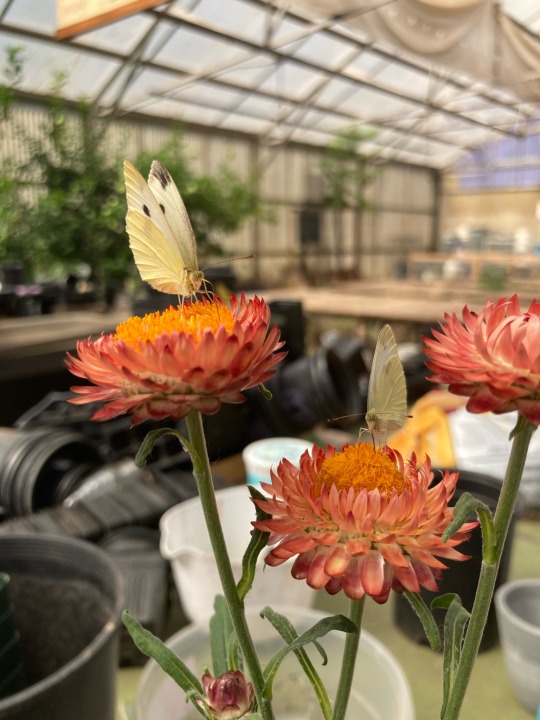

Day 3/100 Days of Productivity
Finished up my accelerated summer course and now my brain is finally free to (animal crossing) study for the LSAT (play animal crossing).
475 notes
·
View notes



